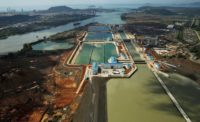Alan J. Krause—president and CEO of Broomfield, Colo.-based engineering-contractor MWH Global, which ranks at No. 123 on this year's ENR Top 400 Contractors list and at No. 16 on the Top 500 Design Firms list—recently spoke with ENR Mountain States Editor Mark Shaw on a variety of topics and industry trends. Here is an edited version of their conversation.
MHW is leading the design work of the Panama Canal Expansion. How is it going?
We are about 80% through design and on target, but the owners want it by 2014, and we'll be pushing that. The job has five million cubic yards of concrete. We have production infrastructure in place and are into heavy production mode. We may have to re-sequence the gates to meet the schedule. They weigh eight million pounds each, so it's going to be quite a task to get them from the manufacturer in Italy. There are almost no ships big enough to carry those lying flat, and if you try to transport them upright, you've got the world's largest steel sails.
Several large firms have had legal issues lately, including bribery charges, bidding problems and subquality work. What's your take?
 |
| Krause |
How have those increased risk factors affected the international business climate?
Like all other firms, we try to define risk, manage it and insure against it, but owners became more resistant to adopting risk during the recession, so that complicates the equation. Companies that have taken on bigger risks just to stay afloat are taking huge chances, rolling the dice. Today's increased risk factors force you to choose carefully where you work and who your clients are. Clients that are not business savvy often create risk issues. We work in places that are on the fringes [of safety], but we deliberately avoid battle zones around the world. We were not in Iraq or Afghanistan, unless the work could be done from outside those countries. We have been in Pakistan since 1950, but it is a challenging place to work, with increased security risks.
Why did MWH stop working in Brazil, where the firm had been for decades?
We sold our operations there to a French company. Brazil presented several challenges, including the fact that it was very hard to get paid. Also, business ethics there were not conducive to us, including the social costs. You essentially buy employees for life—you have long-term obligations to employees, even those that work on a contract basis. There's a lot of naïveté among companies [about the rush to work in Brazil]. It has huge infrastructure issues and lots of positives, but it's not easy. To be successful, you have to play the Brazilian game. Which international markets look good to you? We do mostly wet infrastructure and only about 10% mining, but we are targeting more energy-related work, especially oil and gas. We want to grow in Canada, maintain a strong presence in Latin America and increase our presence in Australia, especially on the west coast.
Africa has a huge need for water projects, but where will the funding come from?
We've been doing hydropower in Ethiopia for about 15 years, and we worked in South Africa until things slowed down after the World Cup. But any new push in Africa would have to be strategic and focused. The European market is not that big for us, but we will continue to be a big player in the U.K. We do not work in China.
What about other countries in South America? What about India?
We have a large resource center in India, about 350 people, and another 350 in Peru, which allows us to integrate design tasks worldwide. We now have people working on designs 24 hours a day. Our drawings are on a world server; everything is linked. It's mostly Revit-based, with common accounting to expedite billing. Is that done mostly to cut costs? Cost is a factor, of course, but speed [of design] matters as much as cost to many oil and gas clients. And it's not just to cut costs here in the U.S. There are cost benefits to using American designers on Australian projects; it's cheaper because of the difference in the value of currencies.



Post a comment to this article
Report Abusive Comment